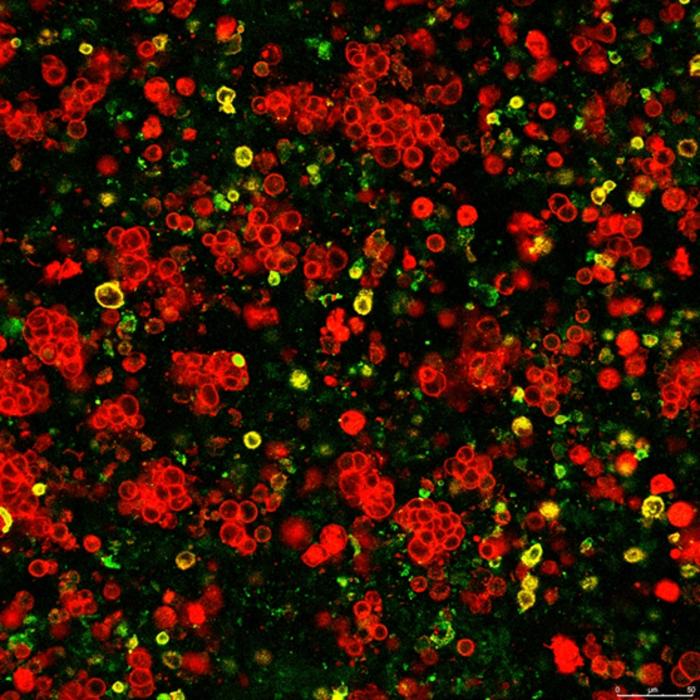Immunotherapy has revolutionized the landscape of cancer treatment, offering hope where traditional therapies have often faltered. Yet, despite its groundbreaking success, immunotherapy remains ineffective for a substantial subset of patients, especially those battling breast cancer. Researchers at the University of Helsinki have delved into the tumor microenvironment’s physical properties to uncover why certain breast cancers evade the immune system, revealing critical insights that could transform precision medicine and tailor therapies to individual patients more effectively.
This pioneering research shifts the focus beyond biochemical communication between cancer cells and immune defenses, illuminating how the mechanical characteristics of tumor tissue itself influence disease progression. The softness or stiffness of the extracellular matrix surrounding tumor cells—historically underappreciated in oncology—has emerged as a pivotal factor dictating immune cell infiltration and activity. Specifically, the study highlights that a softer tumor microenvironment fosters a form of immunosuppression, enabling malignant cells to evade immune surveillance and facilitating faster tumor growth.
Using fresh breast cancer tissue samples directly obtained from patients during surgery, the research team was able to circumvent the limitations of traditional experimental models that rely on cultured cells or animal subjects. This approach allowed a more faithful representation of tumor behavior in its native context. It was observed that within these softer matrices, immune cells become functionally inhibited through a signaling cascade involving cyclooxygenase (COX) enzymes and fibroblast growth factor 2 (FGF2). These molecular signals contribute to a local immune microenvironment incapable of mounting an effective anti-tumor response.
The involvement of COX-FGF2 signaling in the mechanical modulation of immune cells is a groundbreaking discovery that links biomechanical properties to biochemical immunosuppressive pathways. This finding not only elucidates a novel axis of tumor immune evasion but also identifies potential molecular targets for therapeutic intervention. By modulating this signaling pathway, it may be possible to restore immune competence within soft tumor niches and enhance the efficacy of existing immunotherapies.
Importantly, these revelations carry profound clinical implications. The variability in tissue stiffness among breast cancer patients could serve as a biomarker to predict which individuals are less likely to benefit from immunotherapy. This enables a more rational selection of treatment strategies, sparing non-responsive patients from unnecessary side effects and focusing resources on therapies better suited to their tumor’s biomechanical profile.
The Finnish collaboration behind this research is distinguished by its exceptional access to high-quality human tissue specimens, collected through a unique integration of the University of Helsinki, HUS Helsinki University Hospital, and Kymenlaakso Health and Social Services. This seamless pipeline from operating theaters to the laboratory permits the study of live, patient-derived tumors, providing unparalleled insights into the complex interplays governing cancer progression in humans rather than animal surrogates.
Such collaborative infrastructure is rare on a global scale, and the project has piqued international interest among cancer researchers eager to replicate this model. The Finnish research environment, characterized by this synergy between clinical practice and basic science, exemplifies how integrated healthcare and academic partnerships can accelerate translational medicine.
Another core element of this study’s success is the generosity of participating patients, who consent to donate surplus tumor tissue for research. Their contributions are invaluable, offering scientists raw material for discoveries that may lead to improved therapies and ultimately, better prognoses for future patients. This patient-driven aspect epitomizes the ethical foundation of modern biomedical research.
Looking forward, the team’s findings open new avenues for therapeutic development. Drugs specifically targeting the COX-FGF2 signaling pathway or agents capable of modifying the mechanical microenvironment hold promise as adjuncts to current immunotherapies. These innovations could potentially convert immunologically “cold” tumors, resistant to immune attack, into “hot” tumors, which are more vulnerable to immune system eradication.
Moreover, this study underscores the necessity of considering mechanical forces and tissue physicality in cancer biology, domains historically overshadowed by genetic and molecular analyses. Integrating biomechanical perspectives into oncology could yield a more holistic understanding of tumor ecosystems and their vulnerabilities.
Ultimately, the enhanced comprehension of how soft matrices impair immune function within tumors heralds a new frontier in cancer treatment. It advocates for more nuanced diagnostic tools that assess tissue stiffness alongside genetic profiling, enabling precision oncology to reach its full potential. As immunotherapy continues to evolve, such multidisciplinary insights will be crucial for overcoming current limitations and expanding benefits to a broader patient population.
The innovative methods and profound discoveries emanating from this Finnish research embody the future of personalized cancer care. By unraveling the interconnectedness of physical tissue properties and immune suppression, researchers are poised to develop more effective, targeted interventions that could transform outcomes for breast cancer patients worldwide.
—
Subject of Research: Human tissue samples
Article Title: Soft matrix promotes immunosuppression in tumor-resident immune cells via COX-FGF2 signaling
News Publication Date: 27-May-2025
Web References: http://dx.doi.org/10.1038/s41467-025-60092-x
Image Credits: Pauliina Munne
Keywords: Immunotherapy, breast cancer, tumor microenvironment, tissue stiffness, immune suppression, COX-FGF2 signaling, precision medicine, biomechanical microenvironment, cancer immune evasion, human tissue samples.




